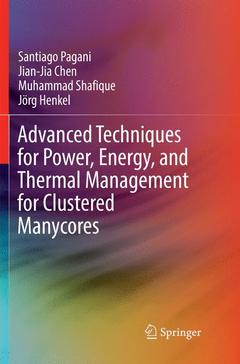Description
Advanced Techniques for Power, Energy, and Thermal Management for Clustered Manycores, Softcover reprint of the original 1st ed. 2018
Language: English
Subjects for Advanced Techniques for Power, Energy, and Thermal...:
Publication date: 02-2019
Support: Print on demand
Publication date: 05-2018
Support: Print on demand
Description
/li>Contents
/li>Biography
/li>Comment
/li>
This book focuses on two of the most relevant problems related to power management on multicore and manycore systems. Specifically, one part of the book focuses on maximizing/optimizing computational performance under power or thermal constraints, while another part focuses on minimizing energy consumption under performance (or real-time) constraints.
Introduction.- Background and Related Work.- System Model.- Experimental Framework.- Thermal Safe Power (TSP).- Transient and Peak Temperature Computation based on Matrix Exponentials (MatEx).- Selective Boosting for Multicore Systems (seBoost).- Energy and Peak Power Efficiency Analysis for Simple Approximation Schemes.- Energy-Efficient Task-to-core Assignment for Homogeneous Clustered Manycores.- Energy-Efficient Task-to-core Assignment for Heterogeneous Clustered Manycores.- Conclusions.
Santiago Pagani is currently a Staff Firmware Engineer & Team Lead at ARM Ltd. (Cambridge, united Kingdom), where he runs an Agile firmware development team working on key components for the next generation Mali GPU products. He received his Diploma in Electronics Engineering from the National Technological University (UTN), Argentina, in 2010. He received his Ph.D. in Computer Science from the Karlsruhe Institute of Technology (KIT) with "Summa cum Laude" in 2016. From 2003 until 2012, he worked as a hardware and software developer in the industry sector for several companies in Argentina, including 2 years as a technical group leader. From 2012 until 2017, he worked as a research scientist (doctoral researcher and later post-doc) as part of the research staff at KIT. He received two Best Paper Awards (IEEE RTCSA in 2013 and IEEE/ACM CODES+ISSS in 2014), one Feature Paper of the Month (IEEE Transactions on Computers in 2017), and three HiPEAC Paper Awards. He received the 2017 ACM SIGBED "Paul Caspi Memorial Dissertation Award" in recognition of an outstanding Ph.D. dissertation. His interests include embedded systems, real-time systems, energy-efficient scheduling, temperature-aware scheduling, and power-aware designs.
Jian-Jia Chen is a Professor of Computer Science at TU Dortmund, Germany. Prior to his current position, he was with the Department of Informatics at Karlsruhe Institute of Technology (KIT) in Germany as a Junior Professor for Institute for Process Control and Robotics (IPR). He received his B.S. degree from the Department of Chemistry at National Taiwan University 2001. He obtained his Ph.D degree in June 2006 with Ph.D Dissertation "Energy-Efficient Scheduling for Real-Time Tasks in Uniprocessor and Homogeneous Multiprocessor Systems.”
Between Jan. 2008 and April 2010, he was a postdoc researcher at Computer Engineering and Networks Laboratory (TIK) in Swiss Federal Institute of Technology (ETH) Zurich, Switzerland



